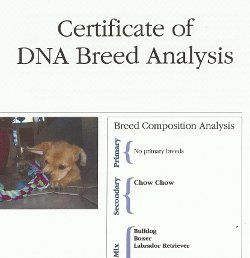|
The world of DNA testing of dogs is relatively new and there’s a lot to it. (If you're wondering why people do it, see our post on DNA testing a dog: Why bother?) Here’s an overview of how they work and what the differences between different tests are. This overview mainly mentions the Canine Heritage XL Breed Test and the Wisdom Panel Insights DNA test for dogs because they are the 2 most commonly used tests, but there are other options as well.
How does dog DNA testing work?
 Scientists have identified breed-specific genetic markers that only show up in dogs with that breed in its lineage. They have done this by comparing the DNA of thousands of dogs to determine the common markers and the variations that distinguish them from other breeds. This last part helps to distinguish different breeds that have similar backgrounds, like the seemingly hundreds of terriers out there. Scientists have identified breed-specific genetic markers that only show up in dogs with that breed in its lineage. They have done this by comparing the DNA of thousands of dogs to determine the common markers and the variations that distinguish them from other breeds. This last part helps to distinguish different breeds that have similar backgrounds, like the seemingly hundreds of terriers out there.
When you submit your dog’s DNA sample, it is compared to these different genetic markers. If it shows up, that breed is in your dog’s background. The tests can also determine how much of the dog it represents.
For example, a dog with a purebred Lab father and purebred Boxer mother would show that it has significant portions of both Lab and Boxer. If a dog had a purebred Lab father and a mother that was half Boxer and half Poodle (no idea what that would look like) then the test would show a significant portion of Lab heritage and medium portion of Boxer and Poodle.
The more breeds show up in a dog, the less significant each one’s effect will be. And remember, a breed may influence a dog's behavior without influencing its appearance, so just because a dog doesn't look like a breed doesn't mean it doesn't have that breed.
How are the dog DNA samples collected?
Samples are usually collected either by blood draw or cheek swab. The blood draw is done at a vet’s office and sent in for testing. Cheek swabs can be done at home with a sample collection kit purchased from the DNA testing company.
How many breeds does a doggie DNA test look at?
It depends on the company. Each one has conducted their own research and developed their own databases, so it really varies. Canine Heritage compares your dog’s DNA to 108 breeds, while Wisdom Panel's different versions look at 185-225 AKC-recognized breeds. If you suspect your dog is a rare breed, check the "breeds detected" lists for the different tests. Other companies look at different numbers, and some offer multiple levels of testing.
How much does it cost?
Again, it depends. For the cheek swab versions, the one-time fee includes the sample collection kit and analysis. For the blood test versions, fees usually include the office visit, blood draw plus the DNA test. You may pay more for tests that include more breeds, meaning that you’re paying more for more accuracy. A test that looks for the 55 most common breeds costs around $55 while a test for 35 additional breeds will be closer to $85 (actual prices may vary).
How accurate are the tests?
Canine Heritage says that they are accurate over 99% of the time when comparing a purebred dog’s DNA to their database. Wisdom Panel’s site says that they cannot give an accurate percentage because they get such varied quality of DNA samples. They do say that when doing multiple tests on the same dog, the results are the same over 99% of the time. Other companies will vary as well.
How do you get the results?
Wisdom Panel will email you the results within 2-3 weeks. Canine Heritage will send you a certificate of heritage with your dog’s photo after 4-6 weeks. (You can click the image above to see the full certificate we got for Nala.) Minimum wait time is 2 weeks though each company varies.
Which test is the best?
“Best” is really based on what’s most important to you. If you’re looking at cost, you’ll probably be ok with the tests that look at the 50 or so most common breeds. According to BioPet (another DNA test company) 92.5% of dogs are covered by the 62 breeds they test for. A cheek swab is also good if cost is an issue because it does not require a vet visit and the associated fees. If it’s more important to you to know exactly what is in your dog, you’ll want a test that looks at a minimum of 100 breeds. If you’re concerned about your dog’s comfort with the procedure, the cheek swab is easier on the dog because it does not require a vet visit or needle. It does, however, require you to take the sample yourself. How easy that is depends on your dog.
There's a lot to the world of dog DNA testing, and the accuracy has come a long way in recent years. If you're curious about your dog's heritage, I highly recommend it. Click here to order your Wisdom Panel DNA test for dogs to check your dog for over 185 breeds.
If you liked this, you may also like:
Choosing a dog: 8 questions to ask
How to find a lost dog
Finding your dog dates
|